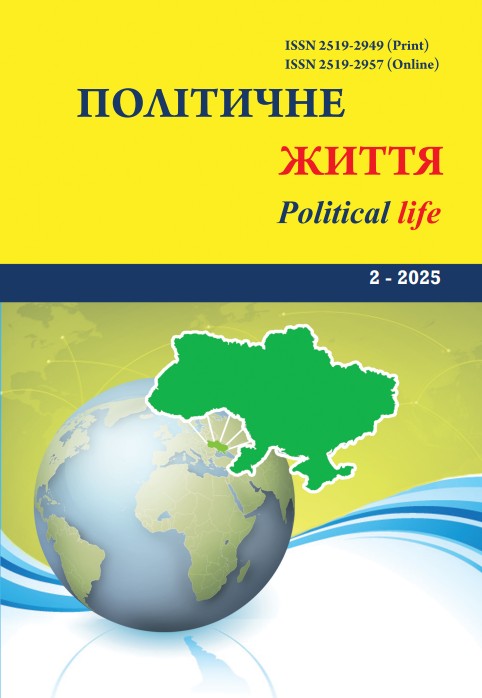Methodology and tools of political marketing
DOI:
https://doi.org/10.31558/2519-2949.2025.2.13Keywords:
political marketing, political party, voter, electorate, political image, political programs, political ideas, political marketing toolsAbstract
The article clarifies the essence and content of the concept of "political marketing". The expediency of considering the concept of political marketing through the prism of strategic, analytical, communication, behavioural and ethical approaches is substantiated. It is determined that the introduction of marketing into the practice of political election campaigns is synchronized with the emergence of a marketing-oriented concept of marketing management and its transformation into the concept of social and ethical marketing. It is noted that marketing in the activities of political forces is most relevant to the concept of social and ethical marketing, focused not only on meeting the needs of consumers and producers of services, but also on achieving a tangible social effect, without which political activity cannot be considered effective. It is revealed that political marketing is used to define all communication measures aimed at forming a favourable perception of a political candidate among voters. It is demonstrated that at the stage of its inception, political marketing was considered as a tool for the development of democracy, with the aim of greater voter involvement and making the political process accessible to the public. It is determined that political marketing is aimed at forming political ideologies, election programs and political images of leaders. The key goals of political marketing include the formation of a positive image, attracting new voters, supporting existing supporters, persuading undecided voters and informing about programs and ideas. It is substantiated that the most frequently used tools in political marketing are: advertising, PR campaigns, social networks and the Internet, direct marketing (targeted mailings, SMS mailings, e-mails, etc.), public opinion research and surveys.
References
Ighomereho O.S., Ezeabasili E.I. The Role of Marketing in Public Policy Decision Making: The Case of Fuel Subsidy Removal in Nigeria. Journal Of Humanities And Social Science. 2013. Volume 6, Issue 5. Pp. 7-15.
Кушнір Т.М. Маркетинговий підхід до дослідження політичного ринку. Проблеми системного підходу в економіці. 2021. Вип. 1(81). С. 93-98. DOI: https://doi.org/10.32782/2520-2200/2021-1-13.
Alupoaei I.-A. Political marketing beyond ethics. 2024 Romanian election for European Parliament: a case study. Annals of the «Constantin Brâncuşi» University of Târgu Jiu, Economy Series, 2024. Issue 5. Pp. 341-353.
Sudarsono. Political Marketing Strategy: Efforts of Regional Head Candidates to Attract the Sympathy of Voters in Wajo Regency. Jurnal Bina Praja, 2024. №16(3), pp. 453–469. https://doi.org/10.21787/ jbp.16.2024.453-469.
Lees-Marshment J. Political Marketing: Principles and Applications. 2nd Edition. London: Routledge, 2014. 290 p.
Політичний маркетинг: поняття, функції і види / Політологія: курс лекцій, 2004. URL: http://politics.ellib.org.ua/pages-2946.html.
Perez Rojas G.A. Political marketing versus propaganda: Dilemmas of political persuasion. Salud, Ciencia y Tecnología - Serie de Conferencias. 2024. 3:674. https://doi.org/10.56294/sctconf2024674.

